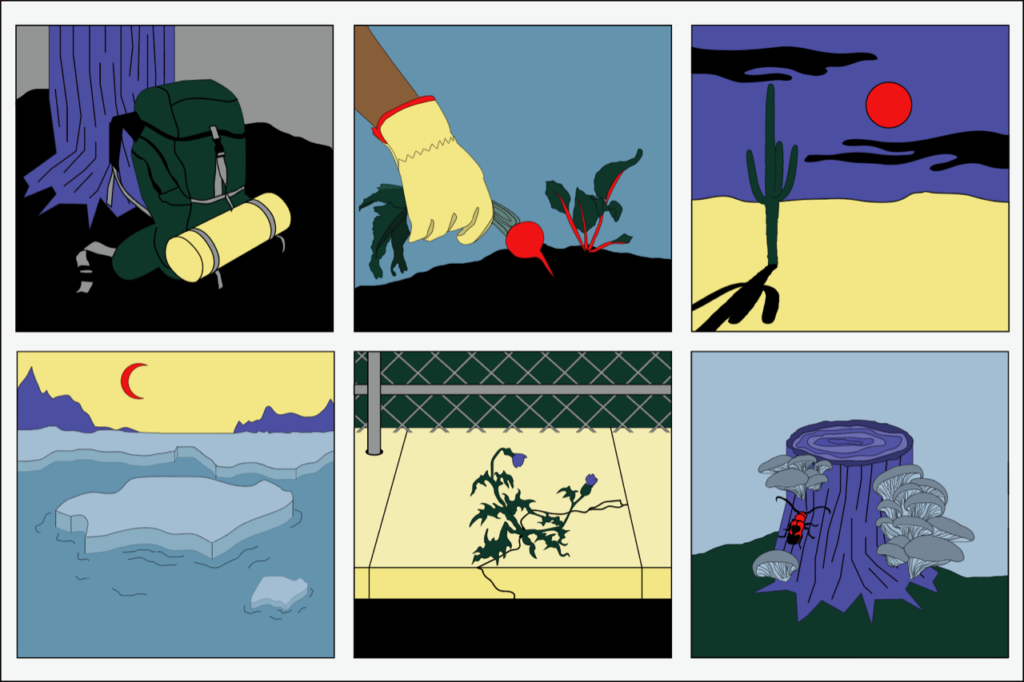
A Hate Symbol in the Wild
The North Cascades in late September have a generosity about it with its sweeping mountain top views. They feel stolen. Imagine this, a light pink, alpine and tree-lined sprinkled horizon sky with clouds delicious enough to sip and frosted blueberry-lined hillsides. Whether it is dusk, dawn, or the middle of the day, oxygen is available to inhale in heaps. You don’t really know what quiet feels like until you experience this type of quiet. The type of stillness that accompanies a blanket of stars to remind you just how small we really are. We sleep soundly out here.
I have a peculiar comfort in the isolation that I share with a select few, an introverted sense of peace that I am perfect as I am in the backcountry. Cut out is that extra societal noise, the constant banter on current trends, news, and the sorry state of organized politics. My self-esteem flourishes beyond capacities I cannot recall holding. It was late in life that I discovered that the wild could provide this sensation to me; that so much of material life is a luxury. That if it came down to it, I would be content living out of my backpack in the backcountry for entire seasons at a time.
When I go on backpacking trips, I would like to believe that it’s just me and my own footsteps, bumbling bears in search of fish and berries, the rushing rivers and the thawing groundcover of snow. I am naïve in my belief that I will meet true isolation with the increasing popularity of backpacking. Even so, the actual perils of the backwoods are parallel to everyday societal dangers.
The first time I saw a hiker with a Confederate flag patch sewed onto his undersized Southwest Pack, I could hear the clacking of his hiking poles, approaching me from behind. I looked over my shoulder, and his quick ascent upon my own pace startled me. I shuffled off-trail to let him pass, and there it was. A dirtied and starred blue X through a red rectangle nestled off-centered to the right of his silver pack. It could have been easily covered. But it wasn’t. I let my pace dwindle to a slow meander and counted on his speed to lose him for good.
I, myself, had a patch sewn onto my gray Osprey that read “PCT Hiker Trash 2018”, a remnant of my Pacific Crest Trail thru-hike. I’m proud of my pack, dirty beyond return, worn to the shape of my shoulders; a pack that shows where I’ve been, the distances I could go. Our packs represent who we are.
His patch didn’t necessarily have the power to do anything to me, but his thinking did. I felt more threat in the wild because of his patch than any other predator in the backcountry. I hadn’t yet encountered a moment like this, in which I was confronted with a symbol of racism in a place that I believed to be a sanctuary from societal conflict. An illusion, actually.
My mind raced.
What if I didn’t have a trail partner with me?
What if I had my rainbow pin on?
By the second, I was giving this (yes) white male, power of fear over me.
I wondered how the conversation would have gone if I had said something. Anything. If only he didn’t have his AirPods in and could observe the hard glances of those he passed. If only I weren’t alone in that moment.
He felt safe showing this symbol on his pack, I realized. His representation had been generously compensated in the American backcountry for centuries. Representation matters. I won’t understand the audacity of what it means to flaunt white supremacist images in a space that belongs to everyone.
The wild extends beyond our forested alpine. Predators come in all shapes, violent ideologies, and sizes. The wild expands to the reaches of the tops of skyscrapers, to a Boeing 747 cruising at 30,000 foot elevation, to grizzlies hunting salmon at the top of a rushing river during a run. Chaos exists wherever we go. We take it with us. What is comforting about the backcountry is that there are rules that we can depend on. A responsible backpacker will rely on Leave No Trace principles, will study maps of where they will go, will come prepared and leave the backcountry nourished, not depleted. Mutual and humane respect may seem too obvious to include in these basic rules for wilderness survival, but perhaps it is vital to leave a reminder:
No hate symbols allowed, not even in the backcountry.
Suggested Reading
-
The Green Millennial
-
The Green Millennial
-
Featured • The Green Millennial

